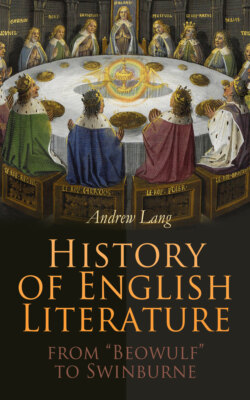Читать книгу History of English Literature from "Beowulf" to Swinburne - Andrew Lang, Robert Kirk - Страница 7
На сайте Литреса книга снята с продажи.
Minstrels, Story-tellers, and Stories.
ОглавлениеPerhaps the oldest of the Anglo-Saxon poems is that called "Widsith," after the name of the far-travelled minstrel or gleeman who sang it before the people in the hall of a prince or noble. This short poem tells us what kind of tales the people liked to hear. It begins:—
Widsith spoke
His word-hoard unlocked,
that is, he opened his treasure of stories as a travelling pedlar opens his box of goods. He says that he has wandered, gathering songs and tales, all over the world from the German Ocean to Egypt and India. He means that he knows all, stories; he is merely giving his hearers their choice of a tale about any king and people in the known world.
Let us suppose that they choose to hear about Ælfwine, or Alboin, king of the Longobards or Lombards, whom Widsith says that he had visited. We know what tales were told of Ælfwine. One of these is a fair example of the rest; it is probably not true. Ælfwine had killed the father of his wife Rosamund, and had a cup made out of the skull, and he made Rosamund drink out of it at a feast. She determined to be revenged for this cruel insult, and took counsel with the king's shield-bearer and guardsman. By his advice she entrapped Beartheow, a very strong man, by a trick, so that he became guilty of high treason. He was now at her mercy, for she threatened to inform against him, and thus compelled him to murder her husband, Ælfwine, in his bed. After that, the king's shield-bearer tried to win the kingdom. But Rosamund gave him poisoned wine, and he, when he knew that it was poisoned, made her drink out the cup, and they two died in the same hour.
This makes a noble tragic song, but the story is only a form of a much older Greek tale which Herodotus, 1000 years earlier, tells of King Candaules of Lydia, of his wife, whom he insulted, and of the Captain of his guard, whom she induced to kill King Candaules.
Probably an Anglo-Saxon minstrel would recite the poem called "Widsith," and then the listeners would ask him for any of the stories which he had mentioned, perhaps for one about Ælfwine; or Alexander the Great; or Sigurd of the Volsungs, who slew the Serpent-Man, Fafnir; or of Hygelac (who is believed to have been the man named, in Latin, Chochilaicus, a real king of about 520); or of Hrothgar, whom Widsith mentions. This king is befriended by Beowulf, in the great Anglo-Saxon poem of that name, the noblest and most famous of all these old songs. The minstrel makes requests for gifts of rings and bracelets; and speaks of his desire to meet generous princes. In the same way Homer loves to tell how golden cups and beautiful swords were given by princes to the minstrels in Greece. The last verses of "Widsith" run thus, in modern English, and are a fair example of early Anglo-Saxon versification:—2
Swa scrithende So wandering on
gesceapum hweorfath the world about,
glee men gumena gleemen do roam
geond grunda fela; through many lands;
thearfe secgath they say their needs
thonc word sprecath, they speak their thanks,
Simle suth oththe north sure, south or north
sumne gemetath, some one to meet,
gydda gleawne of songs to judge
geofam unhncawne and gifts not grudge.
There are few early Anglo-Saxon poems that can be called "lyrics"; they are rather narratives, as in the case of the songs of war, the battles of Brunanburh and Maldon; or "elegiac," and reflective, as in "The Ruined City," though personal emotion, a characteristic of the lyric, often appears in the Christian poems and elsewhere as we shall see.
"Beowulf" the chief poem may be called a brief "epic," a narrative of over 3000 lines, on great heroic adventures. Such a poem would be sung in hall, to beguile more than one long winter night.
